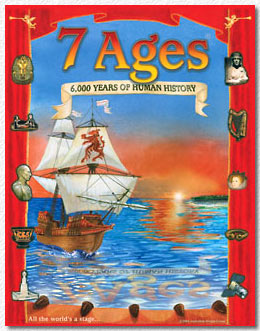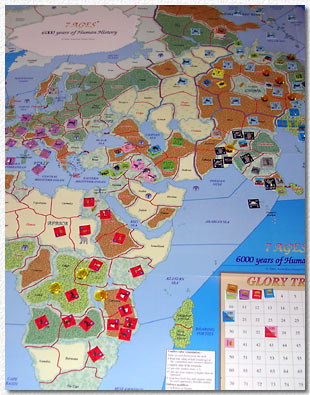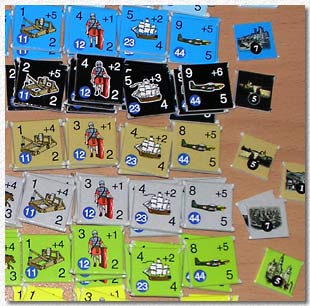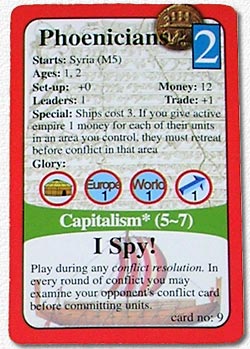
| Designer | Harry Rowland |
| Publisher | Australian Design Group |
| released | 2004 |
| Players | 2-7 |
| Playing Time | 4 hours and more |
 |
||||||||||
|
reviewed by Moritz Eggert
I have to admit something from the start: I love this game. It is great. Please buy it and make Harry Rowland a rich man (or at least help him produce more games). If games like "History of the World" or "Civilization" have ever piqued your interest, this game is an absolute must-have. Believe me. You can trust me. Order it.... NOW!
Now come back to the screen or wherever you are reading this and let me explain why:
"7 Ages" has a bold approach - 6000 years of human history in a nutshell, or rather, if you dare, in a weekend (although you can shorten the game in many ways, see below). If you ever wanted to see the Babylonians make it into the 20th century and develop nukes (possible in the game), if you ever wanted to see many of the historical great empires rise and fall in a grand all-or-nothing game (possible), if you ever wanted to build world wonders like the Colossus or the Hanging Gardens (possible), if you ever wanted to see Native Americans force back a European invasion (possible), this is the game for you.
The game is about gathering Glory points. Each of the empires you play (and you will play many different ones, rest assured) has different "goals". Some want to dominate a certain continent, some want to be the most technologically advanced, some want to have the most cities, etc. Achieving the goals gives an empire around 4 glory points average per turn; if you fall below that number, you might think about dumping an empire and start a new one.
Players can perform various actions, which are as follows:
The number of actions seems daunting at first, but with a very simple rule, downtime is effectively negated: each empire can only perform ONE of these actions! (Harry Rowland writes in the rules that it took him several years to finally discover this solution to the problem of endless turns). At the beginning of a turn all players place action chits (they have one of each the above) on their empires, the phases are then played one at a time and only the empires who have the action will be active in each phase.
 This of course creates interesting dilemmas - on the one
hand, you have to guess the actions of your fellow players and play accordingly, on the
other hand, you have to develop your fruitful empires before they disappear from the
centre stage of history. A common combo is to play production in one turn, then to play
manoeuvre in the next. Two production rounds in a row rarely make sense as you have to
always conquer new territory to earn more money than the upkeep for existing troops that
amass in crowded spaces costs you. But spreading yourself thin makes you extremely
vulnerable to attacks, as your defence will be pitiable.
This of course creates interesting dilemmas - on the one
hand, you have to guess the actions of your fellow players and play accordingly, on the
other hand, you have to develop your fruitful empires before they disappear from the
centre stage of history. A common combo is to play production in one turn, then to play
manoeuvre in the next. Two production rounds in a row rarely make sense as you have to
always conquer new territory to earn more money than the upkeep for existing troops that
amass in crowded spaces costs you. But spreading yourself thin makes you extremely
vulnerable to attacks, as your defence will be pitiable.
"Civilize" is perhaps the most powerful action...if you have the right artefact cards to play, and perhaps an evil event card or two to spare. However, to use it effectively you MUST have played "Destiny" with some other empire, because cards aren't automatically drawn, they have to be acquired. "Trade and Progress" seems boring at first, but many empires need to be advanced to gain glory points, and also many nifty units only become available in higher ages.
This brings us to the "age track", which is the heart of the game. Each empire will have a position on this 7x7 square track, which 1) shows in which age it is (one of the 7 lines) and 2) which units it can build (certain spaces show units which can be bought if you are on or beyond this spaces).
There are also "dark ages" spaces which can only be left via a "trade and progress" action. The game ends, when the final space of the track is reached (or "Internet" is invented - a very funny idea). This happens more or less automatically after a while (barring dark ages) as each empire normally gets a "free progress" at the end of a turn.
The "age track" can also be used to limit game length; one could decide to just play one age for example.
The empire that is farthest ahead on the track denotes the current "age" of the game. There are over a hundred cards representing the cultures (they can also be used as event or artifact cards), but you can only start an empire if it's age is "current". You can even restart an empire (if still possible) that already appeared.
 The amount of units available in the game is impressive
- any possible military unit you can think of is represented, there are even Elephant and
Star Wars counters that would make Ronny Reagan proud (or ashamed, as he should be). In
addition each playable colour (15 empire "colours" are available) has a
completely different counter mix, even different strengths for various units. Therefore,
you better think twice when selecting a colour for an empire that tries to conquer the
seas (for which you need ships) - some colours have more but weaker ships, some less but
more powerful ships.
The amount of units available in the game is impressive
- any possible military unit you can think of is represented, there are even Elephant and
Star Wars counters that would make Ronny Reagan proud (or ashamed, as he should be). In
addition each playable colour (15 empire "colours" are available) has a
completely different counter mix, even different strengths for various units. Therefore,
you better think twice when selecting a colour for an empire that tries to conquer the
seas (for which you need ships) - some colours have more but weaker ships, some less but
more powerful ships.
The combat system (diceless) looks daunting at first, but turns out to be very ingenious and logical. Each player divides their troops in a front and back row, adding support, frontline value, defensive bonuses, bonuses for being in a higher age etc., all this added to a random card that you can look at BEFORE deploying your troops. If you burn up your troops quickly at the front you will have to reuse them and gain disorder markers (which makes you weaker), on the other hand some units are stronger in frontline value than in support and vice versa. The ancient battles at the beginning of the game are usually tense affairs, as the card drawn (valued 0-7) really can make a difference. As technology advances units become more and more powerful and fortifications and cards (luck) play a much lesser role (which reflects the real evolution of military technology). There are some cards that mess around with this, but usually you win a battle that you really commit yourself to with the necessary force, which is nice.
 The best thing though is that war is not the best way to win
- in fact, there are very few cultures, which profit from all-out conquest like the
Mongols or the Huns (following their real-life counterparts). The vast majority of
cultures profits from other things. In our current game, I play the Phoenicians under the
rule of an able artist. Since starting their empire, the Phoenicians have never left
their homeland, instead concentrating on building artefacts. So far, they have a record
number of eight artefacts in their homespace, gaining double as many points through the
artist present. I actually got many more points through peaceful play than if I had tried
to attack my neighbours!
The best thing though is that war is not the best way to win
- in fact, there are very few cultures, which profit from all-out conquest like the
Mongols or the Huns (following their real-life counterparts). The vast majority of
cultures profits from other things. In our current game, I play the Phoenicians under the
rule of an able artist. Since starting their empire, the Phoenicians have never left
their homeland, instead concentrating on building artefacts. So far, they have a record
number of eight artefacts in their homespace, gaining double as many points through the
artist present. I actually got many more points through peaceful play than if I had tried
to attack my neighbours!
All out war never pays off in the game - the more you fight the more you lose opportunities to get glory points. In fact artists (to my great joy the game actually has counters for personalities like Mozart and Shakespeare) can be deemed the most powerful point-garnering leaders in the whole game, much more effective than tacticians and strategists. The most often used tactic is to select an empire that is far away from any "action" or "conflict" and let it thrive as long as you can, of course, but sometimes it also makes sense to start empires close to or even IN other players' lands to limit their progress.
Conflict is therefore sometimes a necessity (and fun to play), but it is nice to see that the game is not solely dependent on it (like "History of the World"). Glory points are forever - once you gain them you don't lose them, so in effect it is not important if you are the big boss on the board - gaining glory points in any way possible is the main incentive.
I already noted that event cards can be very powerful - in fact, this is the only gripe one could have with the game. Some events are so powerful that they literally can erase a complete huge empire with the play of one card. In the long run things equal out, though, as at the moment players oppose a certain empire it is best to give it up anyway, and by having it destroyed one even saves an otherwise necessary time-consuming action ("discard empire"). The events have clearly been introduced to create flavour (of course, there are earthquakes and even the dreaded civil wars which play similar like in "Civilization") and to satisfy players who want to have a "historic" or epic game with no regard to game balance. The rules suggest a "Mike Siggins" variant in which events can only be played on empires "in range" (range is determined by the age an empire is in). I would certainly recommend that variant, but it is also easily possible to leave away the events altogether, especially if you want to play a shorter game. As I already said, events will equal out in the long run, but if you only play a couple of rounds, they can be very unfair.
"7 Ages" is not, as many would expect, a complicated game. In fact the rules are only slightly more complicated than "History of the World". One can tell that a lot of streamlining work has gone into the rules - although some concepts need getting a little used to; the rules only need to be consulted for looking up the various artefact and leader abilities (a handout would have been handy, but isn't existent). They also contain a long fun article covering the whole world history and extensive and interesting designer notes. There is even a quite beautiful and poignant poem by Harry Rowland's father in it, to top things off.
The amount of counters needed for the game is immense. ADG provides six heavily cluttered countersheets (the graphic design is excellent, by the way), but even then many counters can only be found on the back of counters that are needed somewhere else, which makes it hellish to find some particular counter. Some event cards ask for counters that are not existent (or at least we couldn't find them). The amount of named leaders and artefacts is staggering, and if you don't put them in some kind of order before the game you might spend a couple of minutes to find Genghis Khan for example.
I recommend using different, out-of-the-game markers for fortresses (we use small wooden blocks) and unrest (we use the "gem stones" used for Magic the Gathering-type card games). The huge board (two A1 paper sheets) is cluttered with counters as it is, so some different looking, easy-to-spot counters are a nice change. Are all these (minor) gripes damaging the game as it is? Definitely no, you will find your own solutions, and play it nonetheless.
Don't be deluded, though: "7 Ages" is not a game for the casual gamer or for the family gathering. It demands some attention, and especially time. You would need a weekend to play a full game from age 1 (which is actually not necessary, as any age can be used to start a game) with 4-5 players. In contrast to some other monster games in your cabinet this game won't gather dust. It is a game that you will want to store somehow and continue playing again and again. Because there is little downtime every player is constantly involved in the game, and the fascination of seeing empires rise and fall in a truly epic but totally playable game is payoff enough for me. It is even easily possible to join a game already in progress, or to leave a game and come back later. The Internet will be another medium in which this game will thrive - there is already an experimental cyberboard version around, and the game lends itself easily to an online or computer version - Harry should recommend it to the excellent Matrix Games who are already working on computer versions of "Empires in Arms" and "World in Flames".
If you have any love for grand historical games (AND call yourself a non-casual gamer) this game will become a classic for you, to be visited again and again, for countless hours of pleasure. Don't wait, do Harry a favour and order a game, I promise you won't be disappointed.
| add/read comments |
©2004, Westpark Gamers